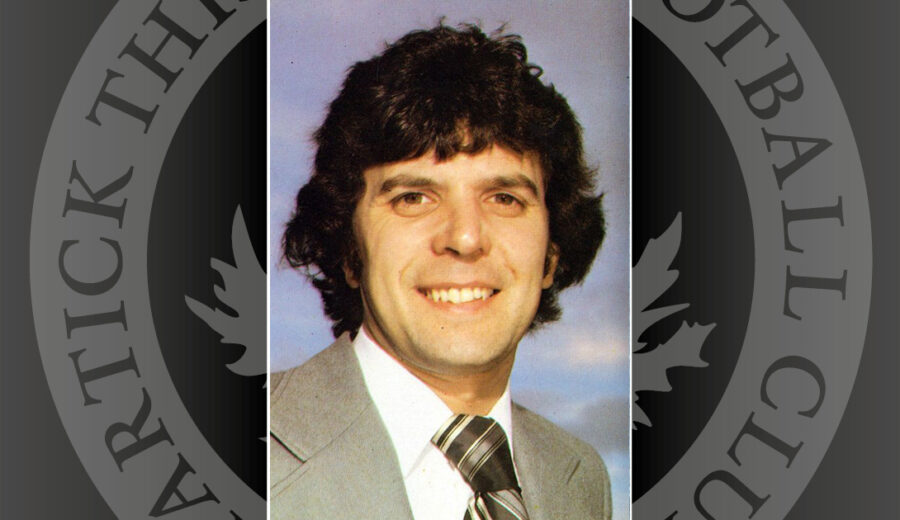
Friday 11th October, 2024 at 4:29pm
Following news of the passing of Peter Cormack, the club provides the following tribute to our former player-manager from 1980 to 1984, a gentleman of the game.
First and foremost, we’d like to reiterate that the thoughts of everyone connected to Partick Thistle are with the family, close friends and loved ones of Peter at this difficult time.
The Partick Thistle men’s first team will wear black armbands during tomorrow’s fixture against Falkirk while supporters and all in attendance will be invited to join in a minute’s applause in memory of Peter prior to kick-off.
Peter arrived at Firhill in 1980, appointed as player-manager, although that’s a somewhat misleading title given his matches served as Jags manager outnumbered those he spent in red and yellow on the pitch, by 182 to one respectively.
He took up his first managerial role with an outstanding pedigree as a player, most notably with Hibernian and Nottingham Forest then especially with Liverpool, where he would win First Division titles, an FA Cup and a UEFA Cup. Also capped nine times for Scotland, with a debut in 1966 against Pele’s Brazil, he travelled to the 1974 World Cup Finals in West Germany albeit was unused.
His task in the dugout at Firhill was an unenviable one, not only having to live up to the challenge of replacing Bertie Auld but looking to begin a new era of success following the most celebrated decade in the club’s history. All this at the age of just 34.
Cormack’s footballing philosophy was one of entertaining and attacking football, in contrast to a more cautious approach by the previous management which the players he inherited were used to, and so the overall report card of his tenure would conclude that the sought-after success was not achieved.
A credible sixth-placed top-flight finish at the end of season one (for which he was in charge from December) was followed 12 months later by relegation from the 10-team First Division. ‘Project promotion’ was immediately reactivated but successive fourth and third-placed finishes in the second tier were as good as it got as the Jags just failed to make it back up under Cormack’s guidance.
However, it wasn’t all doom and gloom, far from it. The first half-season brought silverware as successive 1-0 victories over Rangers in the semi-final and Celtic in the final (an Iain Jardine winner in front of 5,000 at Firhill) brought the Glasgow Cup to Maryhill.
And then came Maurice Johnston. One of the most talked about Scottish footballers of his generation, teenager Mojo would blossom under Cormack, following up his breakthrough season, during which a goal in a 2-0 win at Ibrox was a highlight, with a stunning 34-goal return in season 1982/83 only for Thistle to fall just five points short of promotion (earned by Clydebank and Hearts).
The same margin denied Cormack’s squad in season 1983/84, despite a club record seven straight league wins to kick off the campaign, with the club forced to sell Johnston to Watford mid-season amidst financial pressures. As the campaign faltered, Cormack offered his resignation long before the final fixture of the season although he did remain in post until its end, a season which also marked his only appearance as a player in a defeat away to Brechin City.
Cormack’s length of continuous time in charge of Thistle’s men’s team has only been bettered by John Lambie, Ian McCall and Alan Archibald since. He would go on to manage abroad as well as enjoying short spells at Cowdenbeath and Morton.
Tributes across Scottish and English football today demonstrate just how highly Peter Cormack was regarded and, setting aside any views on his record in the Firhill dugout, the unanimous sentiment across the club from those who knew him was that he was a fine man, a gentleman and a truly great football man, who will be sorely missed.
Peter Cormack – rest in peace. Once a Jag, always a Jag.